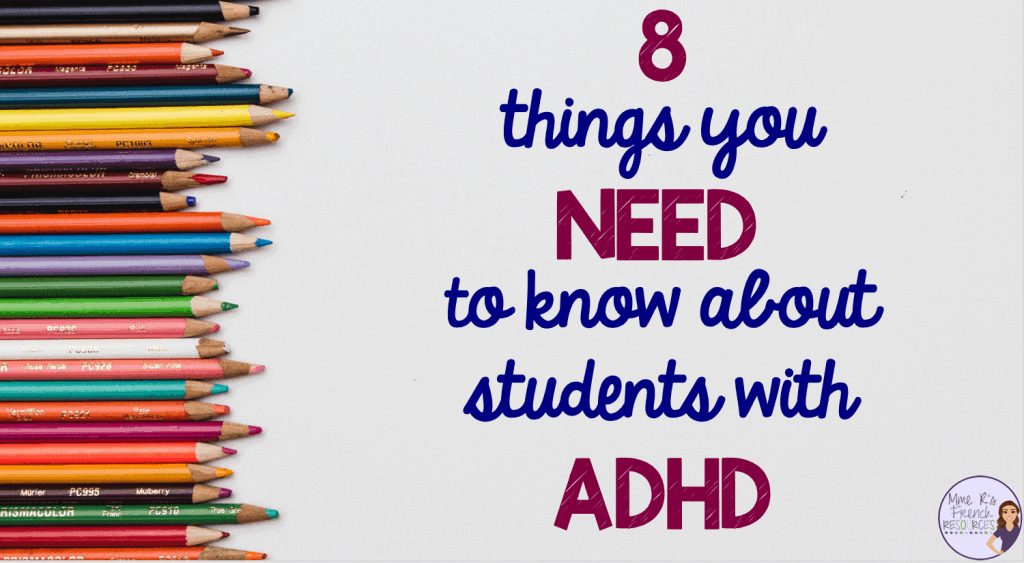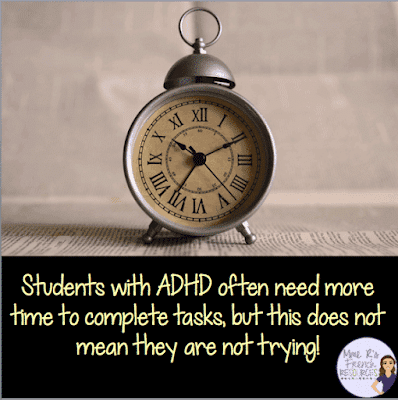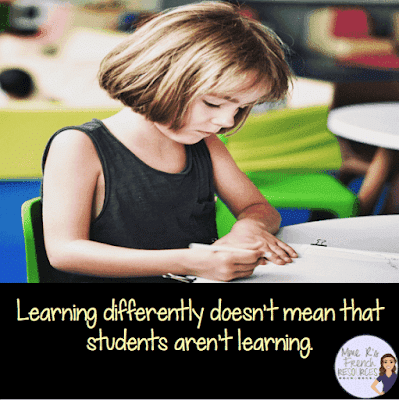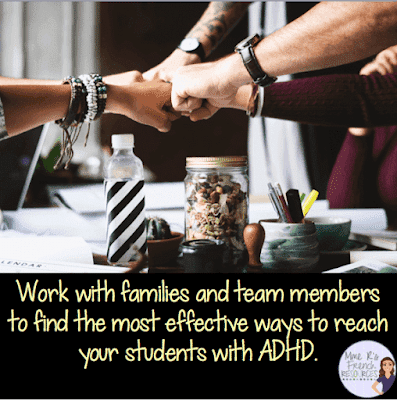
Need to help your students with ADHD? You’re in the right place! As teachers, we all know what it is like to have THAT child. The one who doesn’t seem to listen. The one who can’t sit still. Perhaps it is the student who goes so slowly that it looks like he or she just doesn’t care. The child who interrupts. The one who could do the work, if only he or she tried. Most or all of us will have students with ADHD, which means we all should understand what they struggle with and how we can help.
I’m a teacher, and I’m also a mom to THAT child. The one who didn’t hear the directions. Again. He is still sitting in his chair when everyone else is in line, ready to go. He isn’t done with the task yet. The one who the teacher looks at and thinks, “He is so smart. If he would only DO his work, he’d be amazing.”
Well, he is amazing. He is so sweet, smart, and creative that I am constantly in awe of the person he is growing up to be. Of course I say that, because I’m his mom, but I try my hardest to look at him through my teacher eyes, too, so I can see what his teachers see.
My son has ADHD. I’m here to say that I didn’t understand all those sweet kiddos when I started teaching. Yes, I could see the differences, but I thought, surely, if they only tried harder, they’d get there. If they ate better food, went to bed on time, or just played less video games, they’d be successful. As a teacher, it’s easier to find outside reasons why the child isn’t successful than it is to look at our teaching practices and ask if there is something we could do better. It’s also really hard to understand why something just will not work with a student, even if it has in the past.
Being a teacher and a mom of a child with ADHD
After over a decade of teaching students with ADHD, my own child was diagnosed. It had been hinted by teachers, social workers, and even the doctor, but I didn’t see it. How could my child, my amazing child, the one who could read and ride a bike at four years old, the one who could play with his toys quietly for hours, have ADHD? Well folks, I’m here to tell you…the struggle is real. The differences are real, they are debilitating, and they are just as present at home and everywhere else as they are at school.
I’ve heard a lot of opinons from colleagues and friends about ADHD, and as a teacher and a mom of an ADHD kiddo, it’s clear how lacking our own training and even the continuing professional development on the subject is. Me? I took one special education class that covered so many disabilities and behavioral disorders that it was really easy to confuse them, let alone remember all of the acronyms tossed around in education! ODD, ADHD, IEP, IDEA, ADA, PTSD, SST . . . the list is ridiculous!
Is ADHD a new epidemic?
I see the constant posts online about how ADHD is a new childhood epidemic, how it all comes from parents who are on their smartphones and kids who watch endless tv and play video games nonstop. Well, as a child of the 80s who had no video games, had 3 boring tv channels on an old tube tv that didn’t work so well, and a mom who didn’t have a smartphone, it’s pretty amazing that my son’s problems mirror those that I had at his age.
If ADHD comes from all this new stuff, why do his school reports match mine almost exactly from that age? If ADHD is a brand new thing affecting children, why do I still struggle with these things as an adult? Why do so many people feel the need to prove that ADHD is a brand-new, made up thing, or that it is caused by all of these new gadgets and technology?
We can try to find reasons for ADHD, but the simple fact is we all work with students struggling with this. So, from a teacher, from a mom, here’s what I’d like to share about our ADHD experience. Watching your own child struggle, but knowing that your child is also the one who is difficult for the teacher… well, that’s a hard one to take.
Before going on, I have to say that my son has been blessed with the most caring, amazing teacher this year, and she has made all the difference in his attitude and performance in school. We will forever be grateful she came into our lives. ❤️
Here are some things to know about students with ADHD:
1. The decision to medicate or not can be a heart-breaking choice that many parents are very conflicted over.
There isn’t a right choice, and it is no one’s place to judge a family’s decision. It is a very personal decision for every family, and it takes a lot of consideration. Sometimes medications work well for a while, and then suddenly the dose is all wrong. At times, medications can cause terrible side effects. Other times they are amazing and there are no issues at all.
Some parents don’t want to medicate. Other parents want to get to the root of the problem naturally, if possible. Some families combine medication with natural products. Other families regularly meet with a therapist. There are so many ways to tackle ADHD. The road can be long, and the parents need the teachers to understand that they are trying. Even if you don’t see the results immediately, please know they they are trying.
From talking with families with ADHD at school and in my personal life, I have seen the frustration, the apprehension, and the conflicted thoughts. I have felt them myself. Yes, I want my child to do well. I wish I could get to the bottom of why my child has such trouble with attention, with getting that work done.
Yes, we have tried every food elimation diet around. We’ve taken the vitamins. We’ve tried the essential oils. I have read countless books. All helped a little bit, but nothing has ever been an overnight success, and I can’t just “fix” my child so he will write more quickly or get it all done in the same time as other kids.
2. ADHD is not caused by poor discipline at home.
Yes, it seems like some kids with ADHD just need some structure, some rules. Let me tell you, we have structure and routines at our house. Without it, things just do not happen. My son gets almost no screen time, and he earns that with our incentive program through completing tasks such as homework, putting away clothes, or staying seated at the table during mealtime.
He gets a lot of physical activity. We go to bed early, and he sleeps well. He eats well. Our house has clear and consistent rules. When he doesn’t do work on time, it is not because I have raised a disrespectful child whose intention each morning is to go to school and make his teacher miserable. It is because he needs more time. He will always need more time.
3. Sending the child elsewhere will not make a child with ADHD work faster.
Why would a teacher send a child away because he/she is too slow? If the child is not able to complete work with his/her teacher there, that child will be even less likely to do it when yelled at, shamed, and sent away to work in the classroom of another teacher. All the teacher has done here is lost the child’s trust, and that makes him/her much less likely to want to work for the teacher the next time. Creating fear in a child with ADHD is not going to create productivity.
Some students with ADHD also have a slow processing speed. Learn more here.
If there is a resource room that has been agreed upon by the teachers and family, then allowing the child to work somewhere else might be a good option. If a teacher sends the child to another room because he or she doesn’t want to deal with the student, then the teacher has shut that child down and told him/her that it is a bother to find another way.
4. Every child with ADHD is different.
Yes, every child you teach will be different. Just as we learn the strengths and weaknesses of all of our students, just as we learn their quirks, we should learn what works for each student. There is not a “quick fix” for ADHD. We can’t just add one or two accomodations such as touch strips to a desk or a wiggle stool and feel like we’ve done our part. If the child is older, you can ask him/her what helps. When you are dealing with a younger child, ask the parents what methods they have. If they don’t have any in place yet, you can try some together.
5. ADHD does not just affect a child in the classroom.
Do you notice if your students with ADHD have friends? On the playground, do they interact with others or do they wander the alone? Do they play well with friends of the same age? ADHD affects every aspect of this student’s life. While you are seeing the class behavior, it’s important to understand just how hard every task is. Getting up and getting dressed? Eating breakfast? Brushing those teeth? Getting school supplies together? Being on time?
Every morning, that child and his/her parent(s) have a lot of tasks that are just plain harder for a kid with ADHD. Then school happens, then homework time, then bedtime. It can even be so hard for some kids with ADHD to go to sleep. Parents use every tactic in the world to help these amazing, powerful, active brains to calm down. Weighted blankets, essential oils, herbs, special baths. So, when you deal with ADHD in the class, it’s important to remember that this child deals with it everywhere, everyday. It is exhausting, and it is hard for them to understand, so be empathetic. After all, at the end of the day, they are children with sweet, sensitive hearts.
6. Having ADHD doesn’t mean the child is less smart.
My child consistently scores in the very top percentile of his age group. He speaks, reads, and writes in two languages. He’s a great reader and remembers the smallest details from what he has read, even though math is his favorite subject. For years, his teachers have told me how smart he is, how quick, how much he understands. I understand their frustration when he does not produce the work he should.
Struggling to produce written work is very common for students with ADHD. It does not mean the child is dumb or does not understand. What is does mean is that the child will have a harder time than other students showing you his/her ideas, but it does not mean that those ideas aren’t there. It is important to not give up on a student with ADHD or assume he/she is not learning just because that learning looks different. When students learn differently, they need teachers who teach differently.
7. Students with ADHD want to behave correctly.
A lot of teachers would love to have students with ADHD show up to school ready to sit and work. What we have to know is that these kids HAVE to move. It’s like they are driven by an internal motor that will not slow down. If it is irritating to you, think about what the child feels like when he/she cannot stop it but knows that it will cause problems.
Students with ADHD are not fidgety or slow to annoy teachers. In fact, my son often cries at home about how he wishes he could just be “normal.” Every noise, smell, or movement is a distraction that he feels compelled to investigate. He knows what he is supposed to be doing, but actually doing it means ignoring the distraction. Kids with ADHD struggle with impulse control, so even though they know what is expected, they have a much harder time actually getting there.
8. Multi-step directions are harder for students with ADHD.
If a teacher gives directions while walking through the room passing out papers, he or she might just have to repeat those directions for the students with ADHD. Often, they can remember the first step, but they will forget everything else they are supposed to do. If the teacher is talking and moving and doing other things, they may not even hear the first step.
My son needs to be near me and focusing on me to hear my instructions. If the tv is on, if I yell from another room, or if I give too many steps, he won’t start on the first one. He just will not even hear me. Move close to your inattentive students. Make sure they are with you. Break it down for them if you need to. They can do everything you want them to do, but they can’t do it if they didn’t hear the directions.
So, what can we do?
1. Provide movement.
This is the number one thing that helps my son. He can’t sit still for 3 hours. Really, what child should? But he cannot. In classes with movement and interaction, a change of pace, and fun, engaging activities, he thrives. In classes where he has to sit still in his chair and complete worksheet after worksheet, he shuts off. He doesn’t get the work done, the teacher gets mad, he gets frustrated, and it all goes downhill from there.
Read HERE to find some ways to incorporate movement into your classroom.
2. Praise your students.
A lot of schools have student awards, and I believe in awarding responsible behavior. However, a lot of students with ADHD will never win no matter how hard they are trying, because by nature, they are impulsive, slow to start, slow to finish, and it just seems like they aren’t following the rules. It may not always look like it, but they are trying. When no one recognizes those efforts, even if those efforts don’t look like everyone else’s, that can be really hard.
I’m a huge supporter of student incentives. And no, I don’t feel like we need to celebrate every little thing a student does. However, when a student does well, a quick pat on the back, a sticker, a stamp, or a note on the desk can go a long way. I know this isn’t something I should have to say, but when your child comes home defeated day after day because he’s trying his very best, to the point of exhaustion, but he doesn’t hear a kind word . . . it takes the joy out of learning very quickly.
We can try to build the child up by recognizing his or her accomplishments or effort rather than tear the student down because he or she doesn’t function exactly as the other students do. When I do student awards, I don’t compare students to one another, because they are all so different. I look for progress that the student is making for him or herself.
3. Provide choice.
We’ve probably all heard the quote that has been attributed to Albert Einstein : The definition of insanity is doing the same thing over and over and expecting different results. Well, if we are doing the same tasks over and over, if we aren’t getting the results we wanted from ALL students, then why do we keep doing it that way?
Of course, there will be tasks that all students must do, but if a student struggles to write, can they do a skit? If they can’t sit and read quietly, can they read out loud to a classmate? If copying spelling words down is not effective (because is it really the most effective way for all students anyways?), is there a way that the student can practice the words out loud or with manipulatives? There are many ways to get to the desired goal, and the more options you offer, the more students you’ll get to master that task. You’ll help your students with ADHD, but you’ll see others thrive, too, when they can learn with their preferred learning style.
4. Work with parents and colleagues.
Parents can be your best ally, and they can also be really difficult to work with. But, in the end, both the teacher and the parent are responsible for the education of the child, so reach out to them. Don’t assume that they are not doing anything at home. Maybe they aren’t . . . but maybe they are doing everything they can while constantly trying to find other ways to help. The point is, we cannot assume. You might find that the parents are a great source of help in finding ways to be successful with the student. If they are not so helpful, then ask your school counselor for strategies that might be effective.
5. Be caring.
We might not see it, but our words, our sighs of exasperation, or our tone of voice can crush a little heart. The bedtime tears over the day’s events are heart-breaking. To know, as a teacher, that your child has caused a teacher to lose his/her patience is awful. To know, as a mom, that your child has been treated in a way you would never wish any child to be treated is worse. So when we are irritated, when we are fed up, it’s really important to treat the child respectfully. Let’s be the adult, be caring, and know that this sweet child is not trying to make us miserable.
When you do have to correct students with ADHD, you can do so respectfully. A quiet conversation at a convenient time can help you address behaviors much better than yelling at the student in front of the entire class. Building a relationship is important with all students. For students with ADHD, it can be the key to a successful year.
6. Take time to figure out ADHD.
Because we are often so lacking in professional development for special needs students, we need to take time to understand what is happening. ADHD can look like laziness, misbehavior, or lack of caring, and if we treat it as such, we are missing an opportunity to educate that child. By understanding what makes the ADHD child act that way, we can begin to see from his/her perspective, and we’ll get why our directions, our worksheets, our manner of doing certain things might not be effective for those students.
I love this YouTube channel by Jessica McCabe. She is an adult with ADHD that helps educate people about the struggles of ADHD. Her videos provide some helpful tips for dealing with particular behaviors. This video is a great place to start.
Click here to watch this video from How to ADHD.
Do you have any tips on how to help students with ADHD? Share them below!





Nancy says
GREAT Article…….my daughter is a Special Ed teacher and has an adopted son (from a family member) with ADHD, ADD, PTSD and some defiant behavior age 8. Everything you’ve written is spot on! My daughter has had custody of this child for 3 yrs now and it’s amazing how far he has come with her and his teachers working together to help him. He does go to a Psychologist and a Psychiatrist. He is on medications and they help him focus. He loves to read and just was tested and is reading two grade levels above his Grade 3 level. Now he has been put into the Gifted and Talented program at school, which he loves. He is kept busy, year round with sports, soccer, swimming and baseball to burn off energy. Summer time he goes to a Camp with sports included also.
Perseverance is what is needed to help these children. All teachers should have to take a course in working with Special Needs Children, so they can understand them, as there are many more children today with Special Needs!
Ashley says
Thank you, Nancy! I’m glad to hear that your daughter and her son are finding success in the. classroom. It is not an easy path, that’s for sure.
I wrote this because I realize how little I actually understood about it from my teacher training. At my school, we did take a course on special needs, but there were so many to cover in a semester that the information provided was very shallow. The special education teachers and coordinators that I have worked with have always been amazing at helping me understand and find ways to implement the student plans to help the students do their best.
It wasn’t until I had my own child with ADHD and saw it from a different perspective that I really started to see how much it affected every aspect of his life. My son also tests several very advanced and is very gifted in a few areas, which can make it even harder. From his scores, it looks like he should just sit down, do the work, and finish before everyone else, but that just isn’t the case. Twice exceptional is a term that refers to children who are gifted and also have some difficulties learning due to a learning disability such as dyslexia or a diagnosis like ADHD. I’ve found a wealth of knowledge for my son in researching 2e.
Mary says
This article is so spot on! I love your observations and advice. I’ve been a special education teacher for almost 25 years, and I can totally relate to your post! Thanks!
Ashley says
Thank you for your kind words! Having a child with ADHD has really opened my eyes up to just how much harder everything is for him. I didn’t understand it so well until I spent a ton of time trying to figure out what works for us at home.
You’re the real expert here, and I am so thankful for both the special education teachers I’ve worked with and those who have helped us. I have gone to my special education colleagues so many times for their expertise when I’m not sure how to reach a student. I’d have been lost without them many times. 🙂
Jules says
Everything you have said here is my story!! I read the first section thinking…yes that is me (a teacher, and now a mom of an ADHD student). Each suggestion, each struggle….. all the same as my experience!! I’m headed into a difficult meeting with teachers and admin regarding my son who is the child you described to a T!
It really is like I wrote it myself. We have struggled, he has struggled, and I feel like I have to continually prove the point behind your article – ADHD is a diagnosis, a real disorder. It is not made up, laziness or simply lack of motivation. Thank you for putting your story and smart, researched-supported suggestions out here. Everything I was looking for is in one place.
Ashley says
You’re welcome! I’m glad it helped you out! I wish I could say that life has gotten easier since I wrote this, but with many teachers each year now, it’s that much harder. Keep your chin up! It takes a lot of persistence and advocacy on our part.